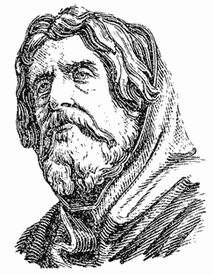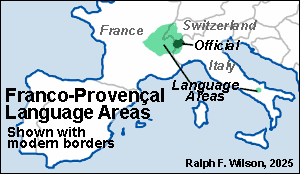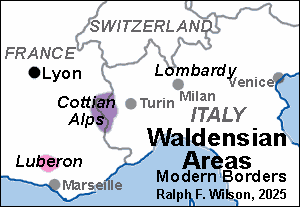
|
Podcast

|
Maturity
Encouragement
Good News
Church
Communion
Prayer
Christian Symbols
Scholarly Articles
Miscellany

|
Easter
Thanksgiving
Pentecost
Stations of the Cross

|
New Testament
Gospels
Acts
Paul's Letters
General Letters
Revelation
Topical Studies

|
Bible Studies
Articles
Books
Podcasts
Search
Menu
Donate
About Us
FAQ
Contact Us
Site Map
 Peter Waldo (1140-1205), from 19th century woodcut engraving, based on a sculpture by Ernst Rietschel (1804-61) |
Where is that in the Bible? It is a vital question, one that keeps us faithful to the teachings of Jesus and the apostles. What is the proper balance between tradition and Bible teaching?
One of the earliest people to ask this "Bible" question is an oft-forgotten figure, Peter Waldo (1140-1205 AD) from Lyon, France. His story inspires me.
At Low Ebb
In Waldo's day, the medieval church in Western Europe is at a low ebb. Church hierarchy is largely corrupt, seeking wealth and power rather than knowing and following Jesus and caring for His people.
The Bible is inaccessible. The only Bible available at the time is in Latin, a language known only to the clergy. As a result, religious ignorance abounds. Many church practices and doctrines have little to do with the teachings of Jesus and the apostles. It is a time that cries out for reform and revival.
Translating the Bible into the Vernacular
We know little about Peter Waldo, except for what his enemies write about him. But he appears to have been a wealthy clothing merchant from Lyon -- a man of some learning and a man with a deep hunger for God.
 Franco-Provençal Language Areas. Larger map. |
Waldo is wealthy enough to pay some monks to translate the New Testament into a language people can understand -- Franco-Provençal, the vernacular language of his region of France. This is unparalleled! The result is revolutionary. Through reading the Bible and the Church Fathers, Waldo begins to seek Christian purity and perfection.
In 1173 AD, Waldo hears an itinerant singer perform a song about a fourth-century Greek monk named Saint Alexius, who had given up a large inheritance and a beautiful bride to live in poverty like Jesus. Waldo is so touched that he sells all he has, gives his money to the poor, sends his daughters to a convent, and leaves his wife the remainder of the real property he owns. (This is a few decades before St. Francis of Assisi forsakes his wealth and begins to preach the gospel.)
Jesus: "If you love me, you will obey what I command." (John 14:15)
Waldo begins to travel around Lombardy, begging, preaching, and teaching about simplicity and poverty -- especially the idea that one cannot serve two masters, God and Mammon. Waldo's earnestness for purity, his focus on Jesus' teachings rather than church doctrine, and his example of voluntary poverty attract followers, forming a large community of believers referred to as "the Poor of Lyon." They also evangelize the region of Lombardy (present-day north-central Italy) while traveling as peddlers, becoming known as Waldensians (followers of Waldo).
Intense Persecution
Waldo travels to Rome in 1179 to seek recognition of his renewal movement by Pope Alexander III. After a hearing, he and his followers are granted permission to live their distinctive faith of voluntary poverty in their homes, but are forbidden to preach because they are laypeople. Waldo and his followers rebel at this restriction and continue to preach and teach the gospel of Jesus.
On one hand, they affirm the Trinity, the fall of man, the incarnation of the Son, and Christ's atoning death and justification. But then get into deep trouble when they begin to oppose church doctrines they can't find in the New Testament.1 They are proto-Protestants.
 Waldensian Areas (shown with modern borders). Larger map. |
By 1184, Waldo is excommunicated and the Waldensians are declared heretics. Many are later reconciled to the Catholic Church and known as the "Poor Catholics," but others, subjected to intense and brutal persecution, are driven away from Lyon and Lombardy. Some settle in the high valleys of the Cottian Alps (in present-day northwest Italy) and in the Luberon, a mountainous region in Provence, France. Three hundred fifty years later, the Waldensians are absorbed into the Protestant movement under the influence of the Swiss and French Reformed churches.
Radicalism
Granted, Peter Waldo is a radical. He deserts his wife and family to pursue a life of poverty and preaching. He resists the church authorities who try to stop him. But when you study the history of revivals, you learn that conformity to the status quo is the opposite of true revival. John the Baptist, for example, is a rough-cut desert loner who leads thousands to baptism for the forgiveness of sin.
Holy Spirit revivals are often characterized by a radical following of Jesus and His commands. Yes, revivals can be messy, sometimes excessive, and involve imperfect people in a move of God. But through revivals, thousands of men and women are touched afresh by the Holy Spirit as He moves in their hearts, leading them to make life-changing decisions about how they will serve Jesus.
Despite Waldo's weaknesses and excesses, we celebrate him and his followers for their courage -- to live in poverty, to align their beliefs with Scripture, and to bear intense, even crushing persecution rather than conform to the surrounding culture that is shamed by their extreme devotion to Christ.
Peter Waldo probes the question: What does the Bible teach? Then he follows through on what he sees, regardless of the cost. A radical? Yes!
May God help us today to settle for nothing less than radical discipleship to Jesus our Lord!
Prayer
Father, shake us awake so that we are not lulled by the status quo but motivated to follow Jesus step-by-step. Give us faith and courage to live as Your faithful men and women in a world that needs examples of people who know You. Empower us by Your Spirit. We pray in Jesus' name. Amen.
End Note
[1] Some of the doctrines they opposed were transubstantiation, purgatory, prayers for the dead, indulgences, and papal excesses, as well as the veneration of relics, pilgrimages, holy water, and the belief that prayers offered in a church were more effective than prayers offered elsewhere.
Copyright © 2026, Ralph F. Wilson. <pastor![]() joyfulheart.com> All rights reserved. A single copy of this article is free. Do not put this on a website. See legal, copyright, and reprint information.
joyfulheart.com> All rights reserved. A single copy of this article is free. Do not put this on a website. See legal, copyright, and reprint information.

 To be notified about future articles, stories, and Bible studies, why don't you subscribe to our free newsletter, The Joyful Heart, by placing your e-mail address in the box below. We respect your
To be notified about future articles, stories, and Bible studies, why don't you subscribe to our free newsletter, The Joyful Heart, by placing your e-mail address in the box below. We respect your